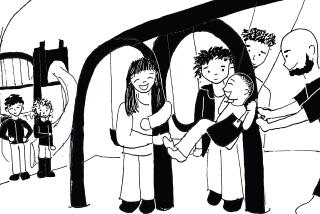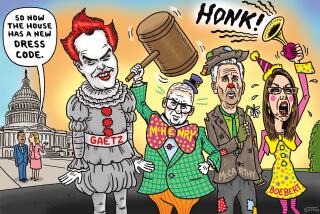Cartoonists Sign On to Help the Homeless
- Share via
Today, some of the most honored political cartoonists in the United States will devote their drawings--and their holiday--to a special project designed to call attention to the plight of the nation’s homeless people.
Dozens of artists across the country have agreed to draw cartoons on the subject. In addition, Pulitzer Prize winners Pat Oliphant, Tony Auth, Jules Feiffer and The Times’ Paul Conrad will spend the day serving Thanksgiving dinner to an anticipated several thousand homeless people at the East Front of the Capitol in Washington. The entire project was organized by Oliphant and social activist Mitch Snyder of the Community for Creative Non-Violence.
“Cartoonists have a very powerful reach,” said Snyder in a telephone interview this week. “There’s always been a tremendous power in cartoons to sensitize people to important issues. We hoped that the editorial cartoonists would take the process a step beyond dedicating their strips, and dedicate their time and bodies to the problem as well. They’re responding in a way that goes beyond just ink.”
“I don’t think any of us want to do it,” commented Oliphant in a separate telephone interview. Oliphant, who achieved fame drawing for the Denver Post and the old Washington Star newspaper, is one of the more widely distributed political cartoonist in the country.
“I think we’re obliged to put our money where our mouths are,” Oliphant said. “It’s something we have to do to draw attention to the way this Administration tends to abandon the homeless, and the general mean-spiritedness of the Reagan Administration. I guess another way of expressing ourselves is to go out and shiver in the cold.”
Snyder worked with Milt Caniff (“Steve Canyon”), Charles Schulz (“Peanuts”) and Garry Trudeau (“Doonesbury”) in 1985 and 1986 to organize the nation’s strip cartoonists into devoting their Thanksgiving Day panels to the problems of world hunger. Proceeds from a book of these strips and an auction of the original artwork were donated to USA for Africa. Although Conrad and the Philadelphia Inquirer’s Auth participated in the earlier projects, this year’s drive represents the first attempt to coordinate the work of the political cartoonists.
The editorial cartoonists welcomed the chance to call attention to the problem and its exacerbation during the Reagan Administration. (Auth and Trudeau already work with the homeless.)
“I was delighted to be asked to participate,” said Feiffer in a telephone interview. Feiffer’s cartoons appear regularly in the Village Voice, The Times’ Sunday Calendar section and more than 90 other papers.
“I devoted my cartoon to what I consider one of the more serious aspects of the problem: housing,” Feiffer said. “The pressure to build low-income housing has virtually disappeared with the widespread acceptance of the basic Reagan ethic that the federal government has no responsibilities--except to collect taxes and build armed forces. Everything else is left up to individuals and the private sector, and we’ve seen how well that works.”
“This issue is a personal thing for me,” agreed Conrad in an interview. I’m reminded of the section in (the New Testament’s Book of Saint) Matthew, ‘I was naked and you clothed me; I was hungry and you fed me.’ That’s what I’m going to Washington to do. Unfortunately, Reagan will be out here on his ranch while we’re back there.”
In addition to his editorial cartoon for the Dayton (Ohio) Daily News, Mike Peters has put Grimm (the dog in his popular syndicated strip, “Mother Goose and Grimm”) on the streets this week. Peters said he’s wanted to tackle the problems of the homeless for some time, but the idea crystallized during a recent trip to New York, when he was struck by the sight of a man sleeping on a grate on 42nd Street--next to a waiting limousine. Garry Trudeau has devoted this week’s “Doonesbury” strips to sweeps of the homeless that took place last month in New York.
Despite the enormous audience their work commands, the cartoonists concede that their presence in Washington will attract less media attention than would rock stars or actors. When asked what he expects the project to accomplish, Snyder replied:
“Aside from serving Thanksgiving dinner to our (homeless) friends, we hope to remind people of those who don’t have a great deal to be thankful for. And I think the people who attend the dinner will enjoy meeting cartoonists whose work they’ve enjoyed for so many years.”
More to Read
Sign up for Essential California
The most important California stories and recommendations in your inbox every morning.
You may occasionally receive promotional content from the Los Angeles Times.










